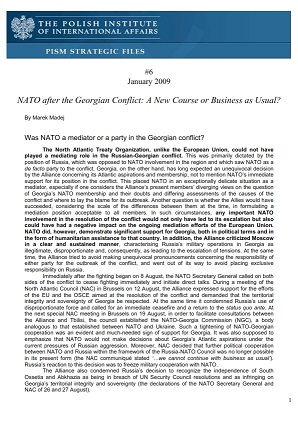№6: NATO after the Georgian Conflict: A New Course or Business as Usual?
№6: NATO after the Georgian Conflict: A New Course or Business as Usual?
Author(s): Marek Madej
Subject(s): Governance, International relations/trade, Security and defense, Military policy, Geopolitics, Peace and Conflict Studies
Published by: PISM Polski Instytut Spraw Międzynarodowych
Keywords: NATO; Georgia; European Union; Russian-Georgian conflict; geopolitics; NATO membership;
Summary/Abstract: The North Atlantic Treaty Organization, unlike the European Union, could not have played a mediating role in the Russian-Georgian conflict. This was primarily dictated by the position of Russia, which was opposed to NATO involvement in the region and which saw NATO as a de facto party to the conflict. Georgia, on the other hand, has long expected an unequivocal decision by the Alliance concerning its Atlantic aspirations and membership, not to mention NATO’s immediate support for its position in the conflict. This placed NATO in an exceptionally delicate situation as a mediator, especially if one considers the Alliance’s present members’ diverging views on the question of Georgia’s NATO membership and their doubts and differing assessments of the causes of the conflict and where to lay the blame for its outbreak.
Series: PISM Strategic File
- Page Count: 7
- Publication Year: 2009
- Language: English
- Content File-PDF

